UK Prerequisites
UK prerequisites for customers who are regulated as AISPs and/or PISPs
Access to Open Banking Directory
To begin the process of setting up all that is required for registering each Institution in the UK, you will need access to the
Open Banking Directory where you will be prompted to log in using the PingId authentication mobile application. If you have not already
gone through the process of setting this up, you will need to go through their
enrollment process first.
Entity Selection
Once logged in, you will be able to see your organisation as one of the available entities:
Expand/Close Diagram
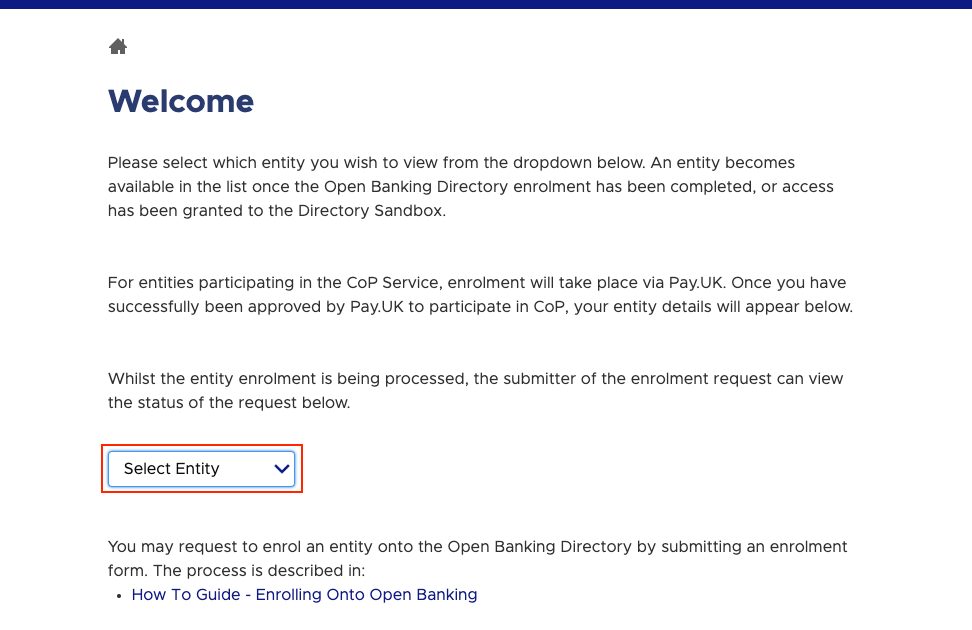
Once choosing your entity, you will then have the ability to go several pages:
- Contacts : Manage access to who has access to features in the Open Banking Directory
- Entity Information : Here you will have key information about your organisation
- Directory Sandbox : Here you can manage the configuration for registering with sandboxes
- Directory : Here you can manage the configuration for live banks
To continue, select the Directory (PSD2) option:
Expand/Close Diagram
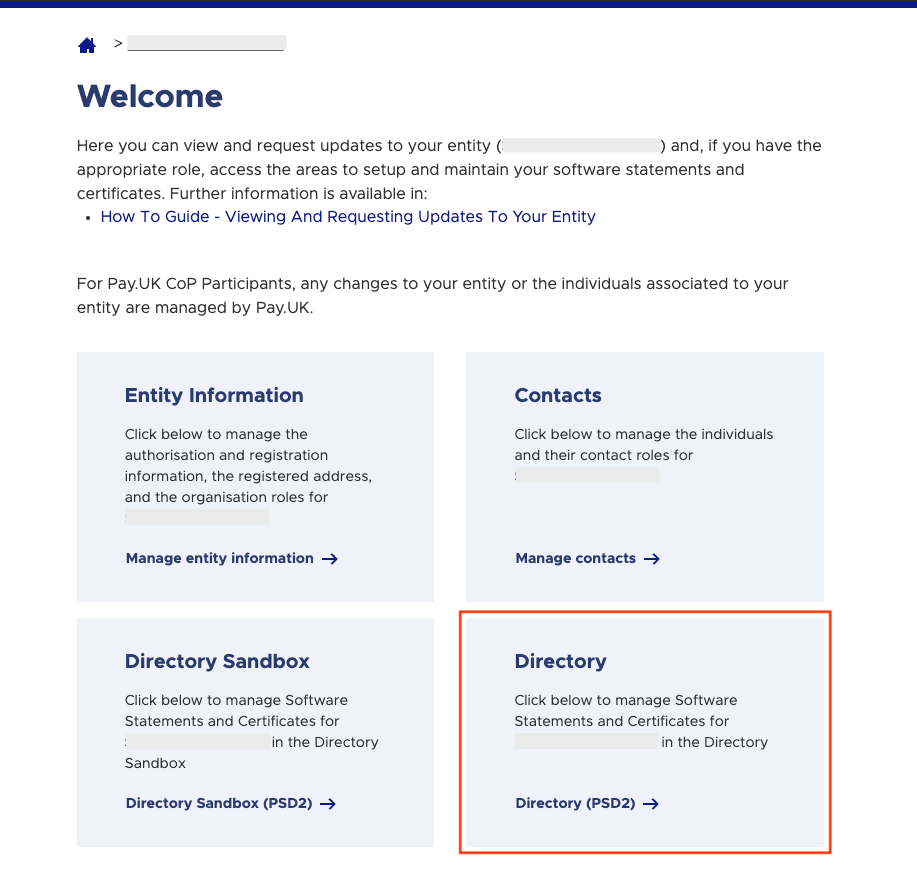
If this option does not appear for you, you will need to speak to someone with the right permissions to give you access.
Organisation Details Overview
Once logged into the Directory (PSD2) of the appropriate entity, you will see an overview of your organisation details.
Take note of the following fields which will be required when creating your certificates:
- Business Information Name : Your registered company name
- Business Information Organisation Id : Your organisation identifier
- Competency Authority Claims Registration Id : The registration identifier from your National Competent Authority (the FCA in the UK)
- Competency Authority Claims Authorisations : Take note of which roles you're approved for e.g. AISP and/or PISP
Expand/Close Diagram
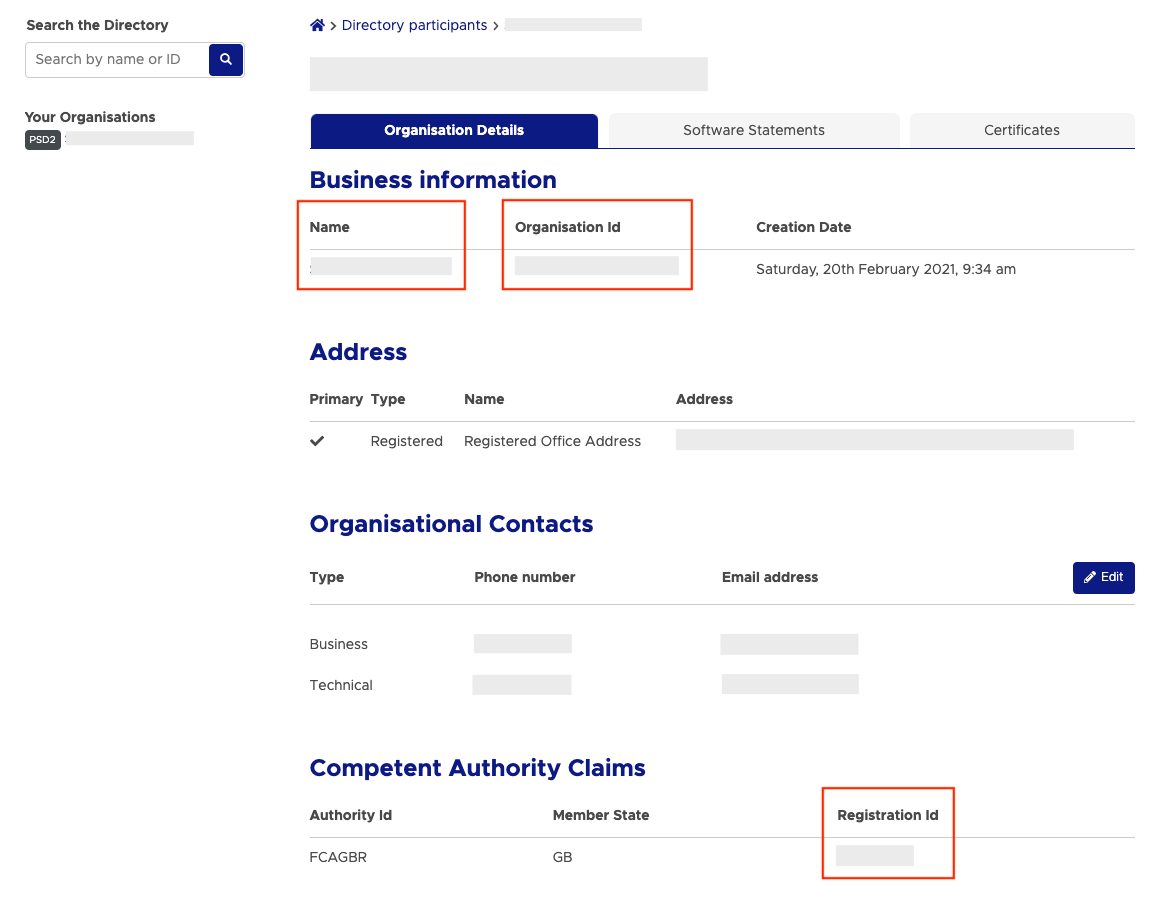
Create Certificates
From the Organisation Details tab, select the Certificates tab and select the Add New Organisation Certificate option to create a new set of certificates:
Expand/Close Diagram

On this page, you will need to create and upload two new certificates created via the openssl utility in a shell
on your laptop. For the UK, you will need to upload one OB Seal (Signing) and one OB WAC (Transport) certificate
to successful authenticate yourself with each Institution:
Expand/Close Diagram
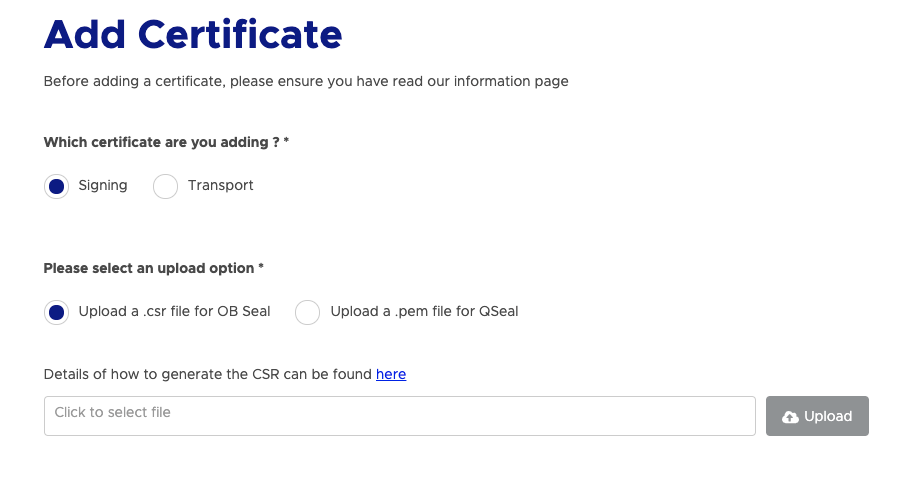
In order to create the certificates, you will need the following details listed in the [Organisation Details Overview] (./#organisation-details-overview). You can use the following helper repo to walk through the process of creating and uploading the certificates to the Open Banking Directory.
Create a Software Statement
A software statement is a collection of information that describes the purpose of your Open Banking application for
each Institution in the UK that your customers will be connecting to.
You can have multiple software statements to separate out your different environments or use-cases e.g. your staging application vs your production application or your mobile traffic vs your web traffic.
To create a software statement, from the Organisation Details tab, select the Software Statements tab and select the Add new Software Statement option to create a new software statement:
Expand/Close Diagram

You will then be prompted to fill in some information about your business. The fields that are particularly important are listed below:
-
Client Name
: This is the name of your business that will be visible to the PSU in the
Institution - Role : This defines whether you will be permitted to use AISP and/or PISP functionality with this software statement
- Policy URI : A link to your organisation's policies
- Terms of Service : A link to your organisation's terms of service
- Client URI : A link to your organisation's home page
- Logo URI : A link to your organisation's logo
- Redirect URI : One or more redirectUrls that your software will use
Expand/Close Diagram
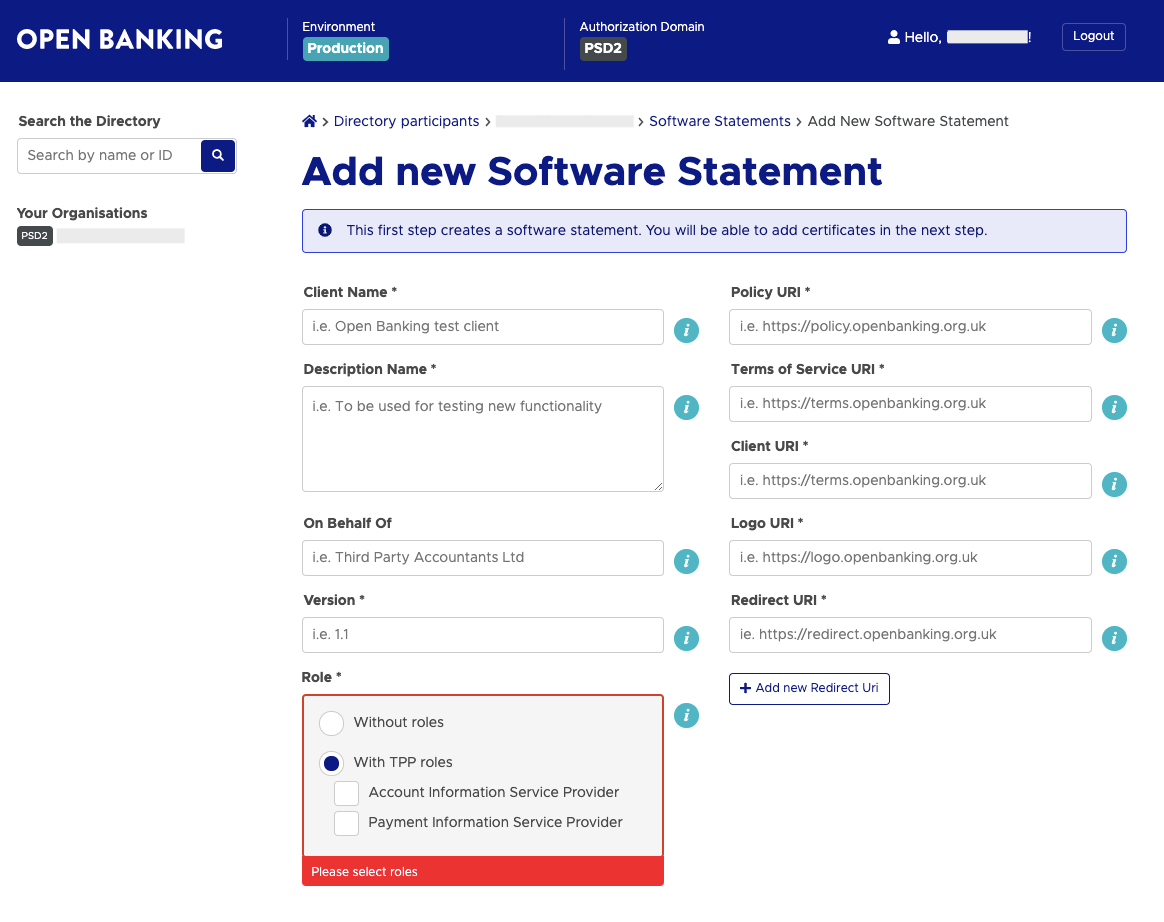
After you have filled in all the required fields, select the Submit option to persist the changes.
Now the Client Id otherwise known as the Software Statement Id is available which will later be used as part of the Bank Registration Process:
Expand/Close Diagram
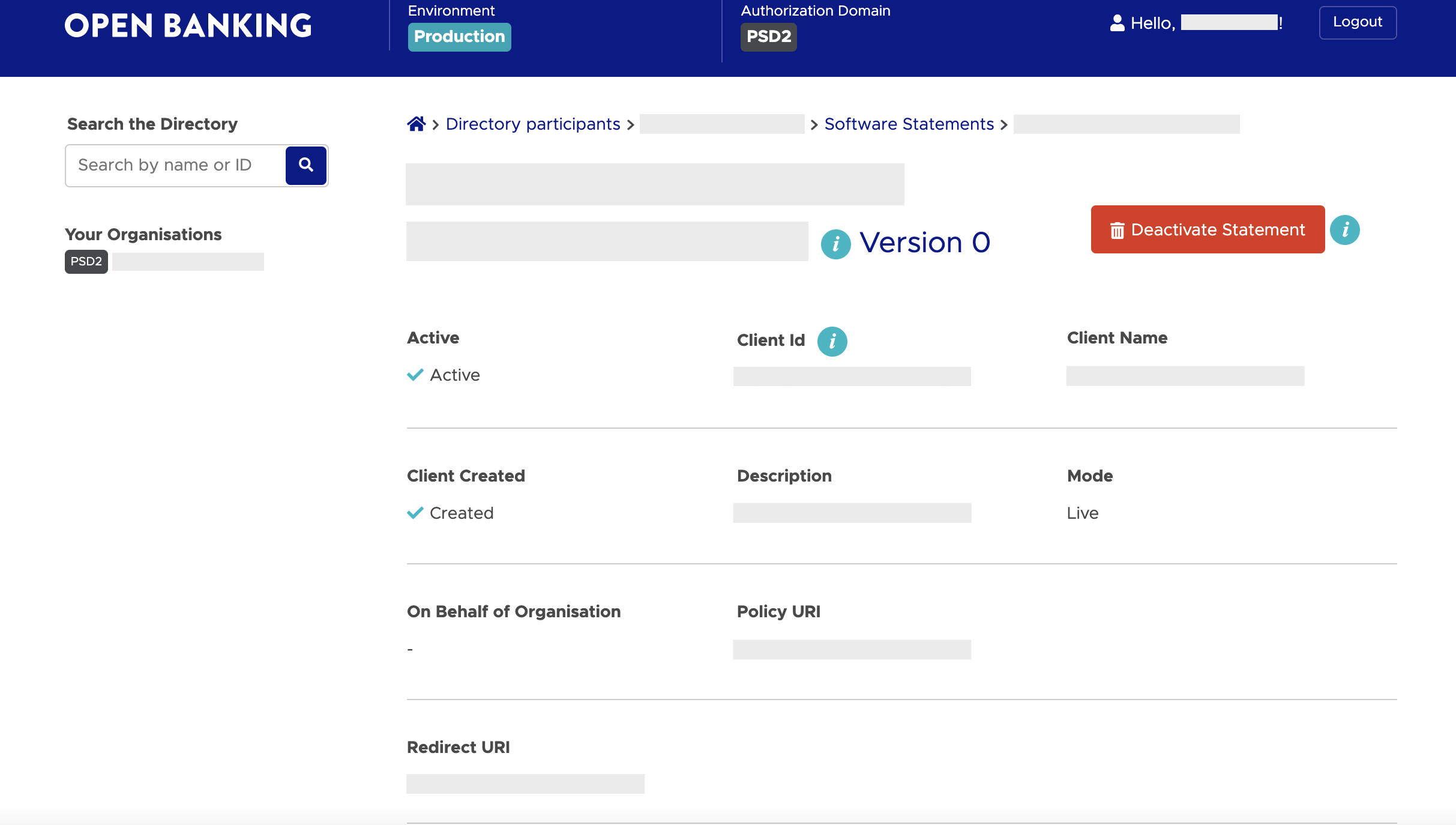
Note
Software statements can not be edited or deleted after creation, however, you have the ability to add more
redirects to an existing software statement or to completely add new software statements. Be aware that as you edit
or create new software statements, that you will have to go through the process of
Bank Registration again for each Institution.
Assigning Certificates to a Software Statement
The last step for finalising the Software Statement is to assign so valid certificates to it. If you scroll to the Keys/certificates section, you should be able to see the organisational level OB WAC and OB SEAL certificates you created:
Expand/Close Diagram

Make sure to check the Associated check box in order to assign both certificates to your software statement. If successful, a confirmation pop up should appear to confirm each assignment was successful. If you have multiple software statements, you're able to use the same set of certificates, so in theory, you could only have one set of certificates used across all your Software Statements.
Take note of the expiry date for both of the certificates and set a reminder as when the expiry date for you certificates
occur, they will no longer be valid to authenticate requests made to each Institution. You will need to perform
Certificate Renewals in good time to prevent any downtime due to expired certificates.
Finally, download the PEM files for both the OB WAC and OB SEAL by clicking on the three dots in each row and selecting the Get PEM option:
Expand/Close Diagram

Naming your Open Banking Certificates
Now, you are ready to upload the certificates to the Yapily Console. In order to help with better identifying your certificates, you can rename each of the files accordingly:
[cert-type].[company-name].KID.[cert-kid].[file-extension]You should end up with the following four files:
obwac.[company-name].KID.[obwac-cert-kid].key
obwac.[company-name].KID.[obwac-cert-kid].pem
obseal.[company-name].KID.[obseal-cert-kid].key
obseal.[company-name].KID.[obseal-cert-kid].pemGenerating a Software Statement Assertion
For any Institution that has a manual registration process, you may be required to provide a Software Statement Assertion
to the Institution during the registration. This is token essentially holds all the information about your software statement such as the
redirect url to use and is what the Institution will use to validate any requests that you initiate to the Institution on the behalf of the PSU.Institution
To generate a Software Statement Assertion, scroll to the bottom of the page on the Software Statement tab for the intended software statement and select the Generate button:
Expand/Close Diagram

You can then copy the output using the Copy to clipboard option as and when needed.
Certificate Renewals
The only time you should be concerned about creating new certificates is when your certificates are about to expire. You should set a reminder in good time to go through the process of creating new certificates before they expire.
When this time comes, you do not need to go through the full bank registration process, however, you must create new certificates
and assign them to your software statement(s) and also add these new certificates to the Yapily Console. Finally, you need to make sure each Institution registration uses your new certificates on the first page of the Institution registration in the Yapily Console.
Back to registration